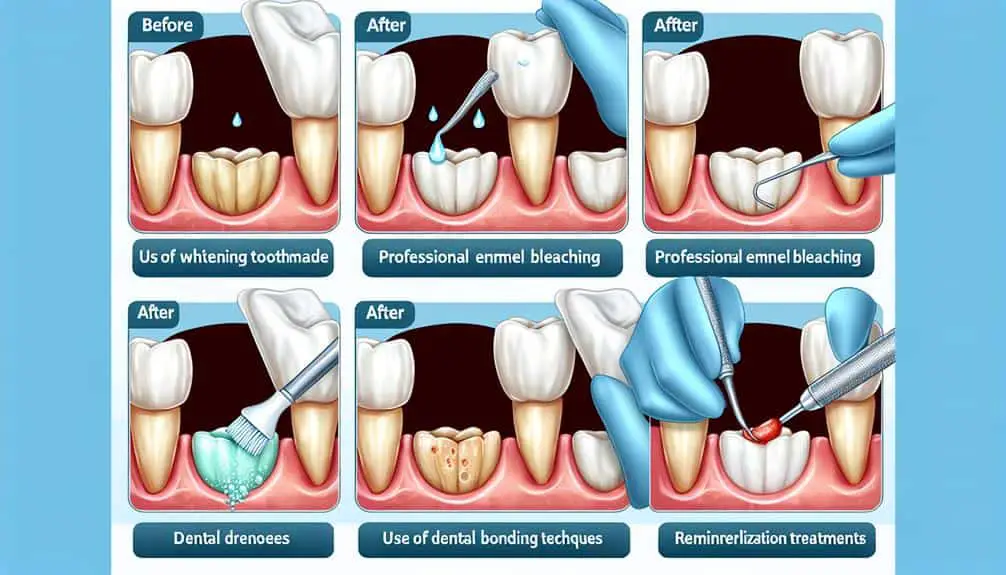Enhance your smile with enamel-safe laser whitening treatments, where specific light wavelengths penetrate to break down stains, all while protecting your enamel. The accelerated whitening process is both safe and effective, offering quick and noticeable results in one session. Understand the benefits of long-lasting effects and customized treatment, minimizing sensitivity risks. Prepare by discussing concerns with your dentist and follow pre-treatment instructions diligently. Essential post-treatment care is vital for maintaining brightness. Discover more about safely whitening your teeth with laser treatments for a confident, brighter smile.
Key Points
- Laser treatments use specific light wavelengths to break down stains safely.
- Enamel protection is ensured with controlled laser technology.
- Quick, long-lasting results with customized, personalized treatment.
- Risks include sensitivity; choose a reputable professional for safety.
- Pre-treatment cleaning and post-treatment care are essential for optimal results.
Understanding Enamel-Safe Laser Whitening
When considering enamel-safe laser whitening treatments, it's important to understand the science behind how this advanced technology works to effectively brighten your teeth. Laser technology in teeth whitening procedures involves the use of specific wavelengths of light to activate the whitening agent applied to your teeth. The energy from the laser penetrates the enamel, targeting and breaking down stains and discoloration without causing harm to the enamel itself. This precise targeting guarantees enamel protection during the whitening process.
The key to enamel protection lies in the controlled nature of laser technology. Unlike traditional whitening methods that can sometimes lead to enamel damage, laser treatments are designed to minimize any potential harm. The laser energy interacts with the whitening agent in a way that accelerates the whitening process without compromising the integrity of your enamel. This makes laser whitening a safe and effective option for brightening your smile while safeguarding the health of your teeth.
Benefits of Laser Teeth Whitening
Laser teeth whitening offers a range of distinct benefits for those seeking a brighter, more vibrant smile. One of the primary advantages is the quick results it delivers. Unlike traditional whitening methods that may take weeks to show improvements, laser treatments can often provide noticeable changes in just one session. Additionally, the effects of laser teeth whitening are long-lasting, allowing you to enjoy your bright smile for an extended period.
Another key benefit of laser teeth whitening is the customized treatment it offers. Dental professionals can tailor the intensity of the laser to suit your specific needs, ensuring a personalized whitening experience. This customization not only enhances the effectiveness of the treatment but also minimizes the risk of sensitivity commonly associated with other whitening methods. By adjusting the settings to match your teeth's sensitivity levels, laser treatments can provide impressive results with minimal discomfort.
Risks and Side Effects to Consider
Consideration of potential risks and side effects is essential before undergoing laser teeth whitening treatment. While laser treatments are generally safe, there are some risks to be aware of. One potential risk is increased tooth sensitivity, which can occur during and after the procedure. This sensitivity usually subsides within a few days, but it's important to discuss this possibility with your dentist beforehand.
Long term effects of laser teeth whitening aren't extensively documented, so it's vital to weigh the potential risks against the benefits. In some cases, overuse of whitening treatments can lead to damage to the enamel or irritation of the gums. It's crucial to follow the recommended guidelines provided by your dentist to minimize these risks.
To ensure a safe experience, choose a reputable dental professional with experience in laser teeth whitening. They can provide guidance on the best approach for your individual needs and minimize the likelihood of adverse effects. By staying informed and cautious, you can enjoy the benefits of a brighter smile without compromising your oral health.
Preparing for Laser Whitening Treatment
Before undergoing laser teeth whitening treatment, it's important to follow specific guidelines to ensure excellent results and minimize potential risks. Prior to the laser whitening procedure, there are significant pre-treatment steps to contemplate. Initially, your dentist may recommend a professional cleaning to remove any plaque or tartar buildup, ensuring the whitening treatment is applied to clean teeth for the best results. Additionally, it's essential to discuss any existing dental concerns or sensitivities with your dentist to address them before the procedure.
Furthermore, it's advisable to follow any pre-treatment instructions provided by your dental professional diligently. These may include avoiding certain foods and drinks that can stain teeth, such as coffee or red wine, in the days leading up to the procedure. Ensuring your teeth are in the best possible condition before the laser whitening procedure will help maximize the effectiveness of the treatment and reduce the likelihood of discomfort during or after the process. By adhering to these pre-treatment steps, you can set the stage for a successful laser teeth whitening experience.
Post-Treatment Care for Whitened Teeth
After undergoing a laser teeth whitening treatment, it's important to implement a consistent oral care routine to maintain the brightness of your newly whitened teeth. Long-term maintenance is essential in preserving the results of the whitening treatment. To achieve this, continue to brush your teeth at least twice a day with a fluoride toothpaste and floss daily. Additionally, consider using a whitening toothpaste to help prolong the effects of the laser treatment.
Sensitivity management is another key aspect of post-treatment care. It's common to experience increased tooth sensitivity after a whitening procedure. To alleviate this, avoid consuming extremely hot or cold foods and drinks. You may also benefit from using a desensitizing toothpaste recommended by your dentist. If your sensitivity persists or worsens, consult your dental professional for further advice.
Frequently Asked Questions
Can Laser Teeth Whitening Treatments Be Customized to Target Specific Areas of Discoloration on the Teeth?
You can achieve precise results with laser teeth whitening by customizing treatments to target specific areas of discoloration. This spot treatment approach allows for a more tailored and effective whitening process, resulting in a brighter smile.
How Long Does the Whitening Effect of Laser Treatments Typically Last Before Needing Touch-Up Treatments?
To maintain the whitening effect of laser treatments, factors like diet, oral hygiene, and touch-up frequency play a role in longevity. Following a recommended aftercare routine and periodic touch-up treatments can help prolong results.
Are There Any Dietary Restrictions or Habits to Avoid After Undergoing Laser Teeth Whitening?
After laser teeth whitening, maintain a post-treatment diet that avoids staining foods like coffee or red wine. Steer clear of habits like smoking to maximize results. Follow these restrictions to preserve your bright smile.
Can Laser Whitening Treatments Effectively Remove Stubborn Stains From Smoking or Consuming Certain Foods and Drinks?
To effectively remove stubborn stains from smoking or certain foods/drinks, laser treatments can be customized for your needs. Their effectiveness and durability make them a popular choice. Consult a professional for personalized advice.
Are There Any Age Restrictions or Health Conditions That May Prevent Someone From Being a Suitable Candidate for Laser Teeth Whitening?
When considering laser teeth whitening, age requirements and health restrictions are essential factors. Safety precautions and treatment considerations vary. Consult a dental professional to assess your suitability based on individual circumstances, ensuring a successful outcome.



